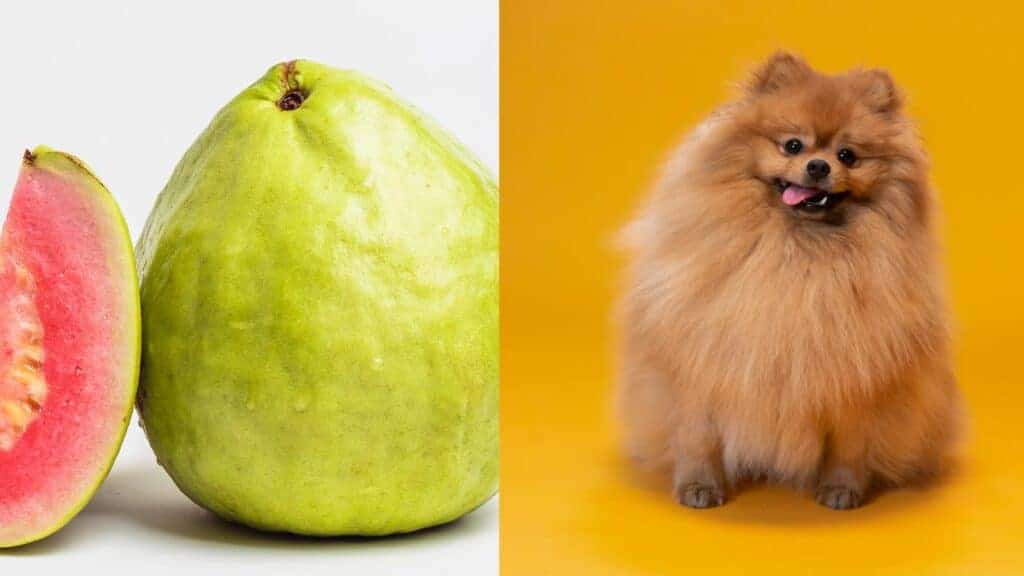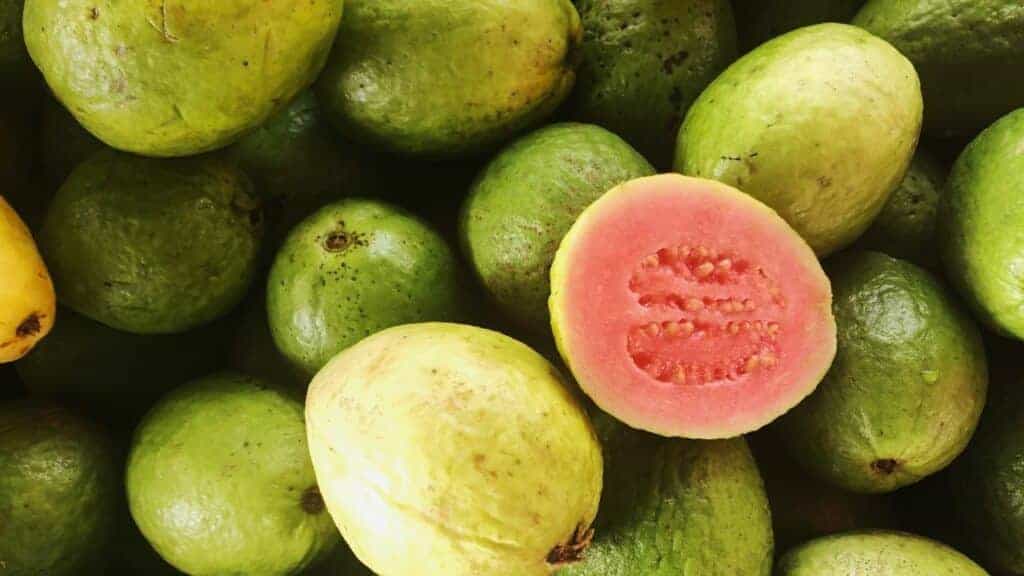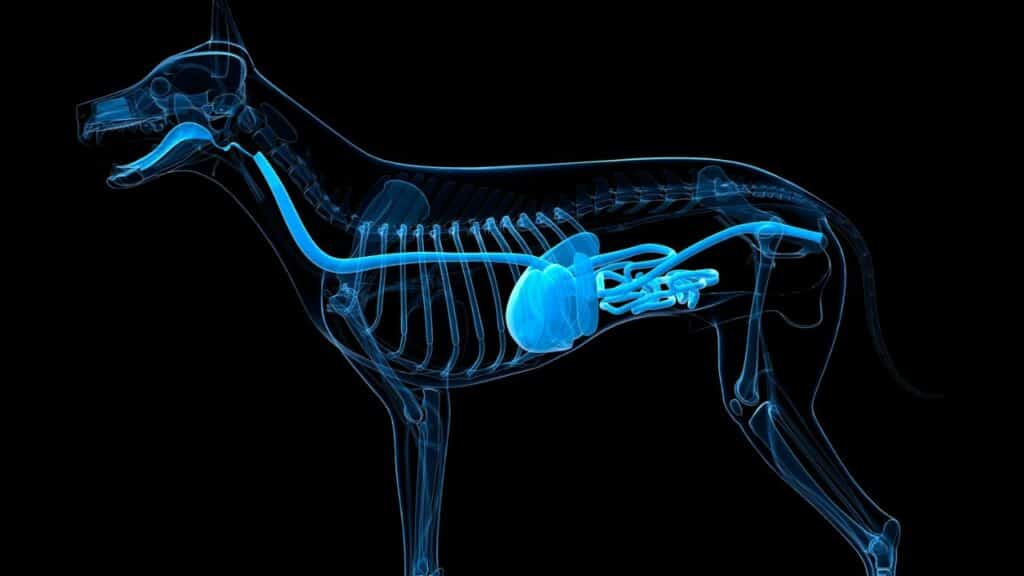Yes, dogs can eat guava in small amounts as an occasional treat.
The fruit has several health benefits, but too much sugar content can lead to weight gain if consumed excessively.
So as you see, it’s safe to feed guava, you only need to be aware of how much sugar and carbohydrates they consume.
As you know now the answer to the question “can dogs eat guava?”, we’ll describe every variety of guava and dish that contains in this blog post so you may learn what is safe and what is not.
Why Are Guavas Good For Dogs?

All dog breeds can enjoy guava fruits because of their nutritional benefits.
Adds Vitamins And Nutrients To Your Dog’s Diet
The guava fruit has various nutrients that are good for your dog.
Magnesium, calcium, potassium, phosphorus, and vitamins A, C, K, and B are all found in high concentrations in guava.
Boosts Your Dog’s Immune System
Tropical fruits like guava are great for your dog’s health and immune system because they contain vitamin C and antioxidants.
Provides Necessary Fiber
Constipation is one of the dog’s most prevalent digestive problems, and fiber can assist with that.
However, giving your dog too much fiber might cause diarrhea.
How Many Guavas Can A Dog Eat?
One or two slices of this tropical fruit a week is fine for a small dog, while large dogs can be given an entire fruit weekly.
Instead of offering a lot of guavas, try giving it in the form of a special treat instead.
Because each dog breed is different in terms of height, weight, and activity level, there is no hard and fast rule for how much guava fruit you can feed them.

Because giant dogs have a greater appetite than smaller breeds, you can increase the amount if you have one.
Guava fruit is healthy for dogs to digest in moderate amounts, but too much of it can cause upset stomach, vomiting, and diarrhea.
What’s Bad About Guava?
There are no known hazardous effects of guava consumption in dogs, but you should still exercise caution while feeding it to your pet.
In addition, here are some other factors to think about:
Digestive Distress
Guava flesh contains a lot of fiber.
Although too much of this could harm your dog’s digestive system, it can also result in significant gastrointestinal distress, including vomiting, diarrhea, and bloat.
It is preferable to remove the seeds and rind before giving your dog any fruit due to the complexity of their makeup, making them particularly challenging to process.

High Sugar
The USDA estimates that 100g of common guava has 8.92g of sugar; although this is typical of fruits, dogs shouldn’t eat much of them.
Pets can benefit from some fructose, but excessive ingestion can potentially cause diabetes.
If your dog already has diabetes, you should avoid giving him any fruits and consult with your veterinarian about the best course of action.
Choking Hazard
Although dogs enjoy chewing, they rarely do it with food to facilitate digestion.
Therefore, when giving your dog guava slices, be careful to chop them into portions in proportion to your dog’s size.
More significant than necessary pieces could result in choking or even intestinal obstructions.
Allergic Reactions
Dog food allergies are uncommon, but it does exist, and you should be worried about them, particularly if your dog has other skin allergies.
Before offering your dog chunks of guava in more significant quantities, please give them a tiny part and watch them for allergic reaction symptoms.
How To Feed Guavas To Your Dog
Follow these steps to feed guava to dogs safely:
Wash the fruit. To clear the fruit’s exterior of any debris or dirt, run it under water.
Remove the rind, and peel the fruit’s rind away with a sharp knife.
Cut the guava in half and remove the seeds, and slice the guava fruit in half to reveal the seeds inside.
Chop the fruit into small pieces to reduce the risk of choking, and cut the fruit into little pieces.
The fruit can be given as a reward or added to your dog’s diet.
Monitor your dog when introducing a new food; when you first give your dog guava, check for signs of stomach discomfort or an allergic reaction.

Benefits Of Guavas For Dogs
Regarding fruit health benefits, guava is a standout, benefiting both humans and animals.
It contains plenty of beneficial vitamins, minerals, and fiber, which can all help your dog feel and look its best.
The list of essential beneficial nutrients found in exotic fruits is provided below.
Vitamins A And K
Vitamins A and K are among the many vitamins found in exotic fruit.
Vitamins A and K are necessary for dogs to have a healthy metabolism. A dog’s body has better immunological and cell function.
Vitamin K prevents blood clots from forming and aids in bone health maintenance.
Additionally, vitamin A supports a healthy reproductive process and system in dogs.
B-Vitamins
B vitamins preserve correct equilibrium and help dogs’ brains make neurotransmitters.
Guava contains the right amount of B vitamins to support the synthesis of neurochemicals in dogs.
Vitamin C
Vitamin C is the most significant nutrient, and this vitamin helps dogs’ immunological systems.
Doctors advise pregnant or nursing dogs to consume vitamin C.
For sick dogs or canines unable to synthesize vitamin C alone, external administration of this vitamin is also a smart option.
Vitamin C is an antioxidant to combat all hazardous substances entering a dog’s body; additionally, it supports the dog’s entire physical system.
Giving your dog a small amount of guava can help if they take a lot of medication or vaccinations and have had surgery.
Iron
Dogs need a healthy, balanced diet to receive all the necessary nutrients.
Guavas will increase the iron-containing characteristics in your dog’s body.
Iron aids in producing hemoglobin and new red blood cells in dogs; thus, all nutrients must be given to them in the right amounts.
Guava will provide iron for your dog, which will help the hemoglobin transmit nutrients and oxygen throughout the body.
Fiber
In dogs, fiber supports a healthy digestive system; guavas contain fiber and are a particularly abundant source.
Although dogs don’t need an external source of fiber, the amount found in guava won’t hurt them.
The fibrous guava controls bowel motions and keeps your dog’s digestive tract in check.
Potassium
Potassium is a crucial vitamin and mineral that cannot be overlooked.
The potassium content in guavas is high; guava has 417 grams of potassium per 100 grams, to be exact.
Potassium supports canine muscular growth and proper organ function, and it also aids dogs’ digestive systems by assisting in the breakdown of lipids and carbohydrates.
Other advantages of potassium include improving a dog’s cognitive abilities, controlling PH levels, and supporting healthy organ function.
Magnesium
Magnesium aids in the absorption of extra potassium and zinc by dogs.
Magnesium can act as a relaxant for dogs who are under stress or experiencing pain.
It also assists with energy production and muscle regeneration.
It is necessary for the liver, heart, and digestive system to function correctly.
Magnesium is frequently helpful in soothing an excited dog.
Sodium
Last but not least, guava contains salt.
This element aids in controlling blood pressure.
This only functions, though, when dogs eat guava in moderation.
Veterinarians advise against giving salt supplements to dogs.
It increases the chance of blood pressure fluctuations.
However, some dogs’ vitamin deficits can be treated with sodium supplements.
Along with the elements already mentioned, guava also contains phosphorus, calcium, and lycopene, which are crucial for a dog’s fitness.
Conclusion: Can Dogs Eat Guava

Knowing what dogs can eat is of utmost importance for dog owners.
Being a dog parent, it’s safe to give your pet some fresh fruit as a special treat once in a while.
Just as significant is what you should not feed your dog; dog owners can offer their pets many types of guava, including apple guava, pineapple guava, red guava, and Thai guava.
Guava contains plenty of beneficial nutrients for both humans and dogs!
It is a natural response to share because we are all occasionally susceptible to falling for those vast eyes staring so closely as we put food into our mouths.
Therefore, feel comfortable sharing it with your loved one the next time you sit down with a fresh guava snack and your dog gives you those eyes.
Before You Go…
Now you know the answer to the question, “Can dogs eat guava?”.
If you want to learn more, read the following articles too!


